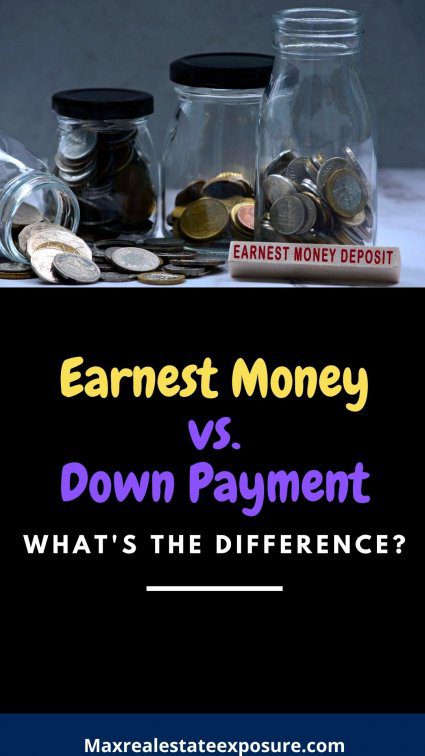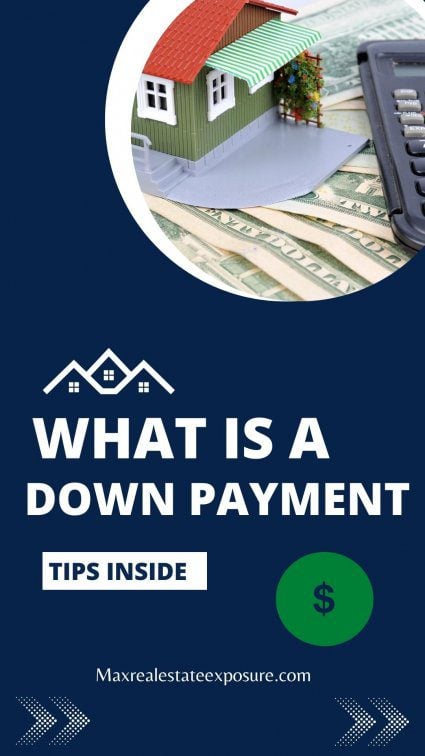Earnest Money vs. Down Payment

The earnest money vs. down payment question comes up quite a bit in real estate sales.
If you are a first-time buyer purchasing a home can be mysterious at times. There are many terms and procedures that can be confusing unless they are explained. There are many important mortgage terms to know.
Potential home buyers often ask what is the difference between earnest money and a down payment. While these two real estate terms are similar they are not exactly alike.
An earnest money deposit functions as a promise to the seller, while a down payment is a promise to the lender providing your mortgage loan.
Earnest money provides security to a seller. On the other hand, the down payment is used to buy the home you will be mortgaging. So while they are similar, earnest money and a down payment differ from one another.
Let’s look at earnest money vs. down payment in a real estate transaction more closely.
What is Earnest Money?
When you buy a home it is expected you will put up an earnest money deposit. The earnest money shows that you are serious about purchasing a property and are not going to be wasting the seller’s time.
If there was no earnest money, a buyer could choose not to move forward without any financial harm. The earnest money is insurance the buyer will perform their obligations according to the contract.
Earnest money funds are typically between one to five percent of the home’s purchase price. These monies are held by one of four parties – the seller’s real estate company, a title company, a dedicated escrow agent, or the seller’s attorney.
In most real estate transactions, it’s held by the listing agency in an escrow account. The monies remain in escrow until the property closes. In the event the transaction falls through, the earnest money will be given to whoever is legally entitled to have it.
Who keeps the earnest money depends on whether the buyer followed the contract terms or not.
Is Earnest Money Refundable?
One of the most popular questions in real estate is who gets to keep the earnest money deposit. Quite often, buyers will ask if their earnest money is refundable. Earnest money is refundable as long as the buyer follows what’s been agreed to in the contract.
However, if a buyer breaks the contract they would be open to losing their earnest money. When a contract is broken a seller would be entitled to keep the funds.
Most of the protections a buyer has in a real estate contract are based on the agreed-upon contingencies. Some of the most common contingencies in a contract are a home inspection, appraisal contingency clause, and mortgage financing clauses.
Home Inspection Contingency
A home inspection contingency states the buyer will be allowed to opportunity to have a professional inspect the property. It also gives the buyer a set amount of time to have the inspection done and the results back to the seller.
One of three things can happen when issues are discovered during an inspection. The buyer can terminate the contract and have their earnest money returned. They can ask the seller to remedy the problems, or they can ask the seller for a monetary concession.
If an agreement cannot be reached the buyer would be entitled to get their earnest money deposit back as long as they notified the seller in the agreed-upon time frame.
Appraisal Contingency
An appraisal contingency states that the home must appraise for the purchase price or higher. In the event it does not, the buyer would be able to terminate the transaction and get their deposit funds back.
It hot real estate markets, it is possible a buyer may decide to waive the appraisal or add an appraisal gap clause that says they will cover a certain amount of money if the property appraisal comes in low.
Mortgage Financing Contingency
Unless a buyer is paying cash, there will be a mortgage contingency clause in the real estate contract. The language will state the buyer intends to procure financing from a mortgage lender for a specified amount by a certain date.
If the buyer is unable to obtain the financing they would be able to have their earnest money returned.
In the event the buyer did not notify the seller, their earnest money would be at risk and could be forfeited.
Home Sale Contingency
Occasionally, but not often there will be a home sale contingency in a real estate contract. A home sale clause would give a buyer the right to terminate the sale if they did not sell their home in a specified amount of time.
Home sale contingencies are frowned upon by most real estate agents because they are risky for home sellers. You rarely see home sale contingencies in strong seller’s real estate markets.
What is a Down Payment?
 The house down payment is the amount of money you are putting towards buying a house that won’t be financed. The amount of money you decide to put down on a home can vary tremendously.
The house down payment is the amount of money you are putting towards buying a house that won’t be financed. The amount of money you decide to put down on a home can vary tremendously.
The amount of down payment you need depends on the type of loan you take, as well as several other factors. Before making an offer on a house, it is essential to know how much you will be putting down.
It will be one of the terms stated in the real estate offer to purchase.
Your Mortgage Loan Type Dictates Minimum Down Payment Amounts
Here are down payment requirements for different mortgage types.
Conventional Loan
Lending institutions typically require a down payment of at least 3% on conventional loans; however, it is not uncommon to put down 20%.
Private mortgage insurance (PMI) is not necessary when financing a home with 20% down, so this is often a down payment amount borrowers will strive to achieve.
The PMI is paid to protect the lender in case of loan default. By decreasing the monthly payment and eliminating an extra charge, it reduces risks for both parties involved.
Home buyers who put down 20% on their homes may also qualify for a more favorable interest rate on their mortgage.
FHA Loans
FHA loans require a down payment of 3.5%, which makes them an attractive option for some buyers. However, the mortgage insurance premiums are higher than on conventional loans, increasing the cost of monthly payments.
If you are buying a run down property, hoarders house, or other distressed property that needs work an FHA 203k loan could be the perfect loan.
VA Loans
A VA loan does not require a down payment of mortgage insurance. If you are serving or have served in the military, you could be eligible for a VA mortgage. The no down payment requirement makes it a very attractive loan type for some borrowers.
Buyers can also have a gift letter for a mortgage as well. Gift funds are typically made by a close relative such as a parent who helps one of their children purchase a home.
Is Earnest Money Part of The Down Payment?
Does earnest money go towards down payment or closing costs is also asked quite a bit.
The earnest money you put up when buying a home can be applied to either the down payment or the closing costs.
Earnest money is part of the funds you pay upfront to purchase the home but is not in addition to a down payment. For example, let’s say you’re buying a home for $600,000 and you have a 5 percent earnest money deposit. There would be $30,000 held in an escrow account.
If you are putting 10 percent down and mortgaging 90 percent, you would need to put up an additional $30,000 which would be a total of $60,000 or ten percent of the purchase price.
Home buyers need to remember they also need to have cash on hand for all of the buyer closing costs. Some examples are funds for a title search, attorney fees, real estate appraisal, and title insurance among others.
The down payment is paid directly to the seller as part of the money disbursement process at closing. The mortgage company pays the remainder of the purchase price to the seller and assumes a mortgage loan on that amount from the buyer.
When comparing earnest money vs. a down payment both are duly accounted for at the closing.Click To TweetFinal Thoughts
As you can see, earnest money and down payments are similar to one another but they do differ. Both are essential parts of the majority of all real estate transactions.
It is vital for buyers and sellers to understand the nuances of a down payment vs. earnest money. If you are still unclear about the differences, feel free to reach out for assistance.
About the author: The above Real Estate information on earnest money vs. down payment was provided by Bill Gassett, a Nationally recognized leader in his field. Bill can be reached via email at billgassett@remaxexec.com or by phone at 508-625-0191. Bill has helped people move in and out of many Metrowest towns for 35+ years.
Are you thinking of selling your home? I am passionate about real estate and love sharing my marketing expertise!
I service Real Estate Sales in the following Metrowest MA towns: Ashland, Bellingham, Douglas, Framingham, Franklin, Grafton, Holliston, Hopkinton, Hopedale, Medway, Mendon, Milford, Millbury, Millville, Natick, Northborough, Northbridge, Shrewsbury, Southborough, Sutton, Wayland, Westborough, Whitinsville, Worcester, Upton, and Uxbridge MA.

